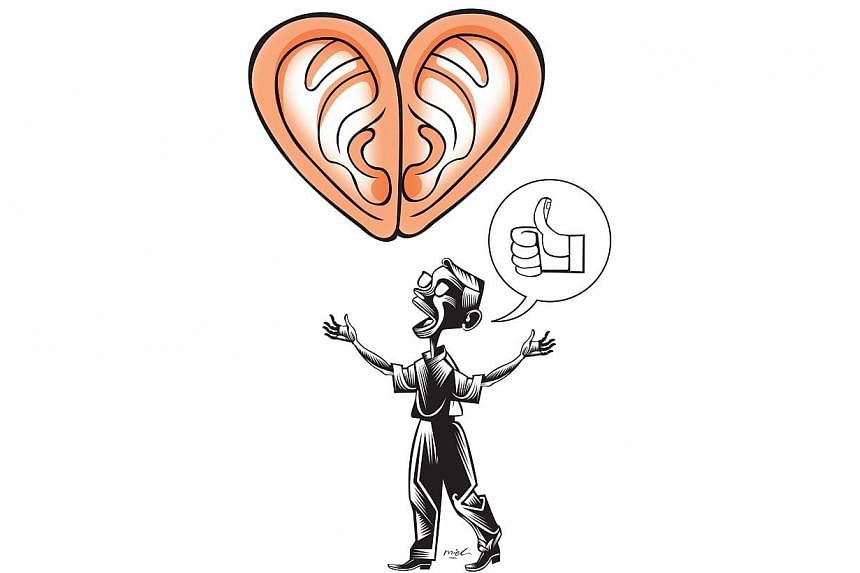A negative climate appears to loom large in Singapore, judging from some online and offline comments on the Government, public institutions, public service providers and foreigners.
Public expressions of negative emotions need not always be a bad thing. They reflect people's concerns, aspirations, goals and experiences. They can and have helped policymakers identify problems, revisit priorities and formulate solutions.
But the natural expression of negative emotions over an issue is not the same as having what is termed a "negativity mindset".
Such a mindset is developed and strengthened over time, by repeated, unresolved negative experiences and emotions. It can be fuelled further by misinformation and misinterpretation.
Once formed, negativity comes fast and strong. And yet, turn the tide we must, for the well-being of Singaporeans and the future of Singapore.
But first, we need to understand the nature of such a mindset.
A negativity mindset
A NEGATIVITY mindset is a predisposition to regard a person or group unfavourably based on who the person or group is, rather than on what they say or do.
The target can be a politician or a political party. It can also be an advocacy group or a segment of the population such as the online community of a website.
A negativity mindset can occur in anyone, regardless of educational background, socioeconomic status, political belief or moral position. Citizens, advocacy groups and policymakers - no one is immune to developing a negativity mindset.
A person with a negativity mindset focuses only on the negative attributes of the target. These might be true negatives, but they could also be neutral or positive points reinterpreted as negatives.
There is little or no reflection on the target's position, the issue or the context.
Is the interpretation supported by facts? Is the reasoning valid? Are the values and principles underlying the position desirable and acceptable?
These questions do not arise or are not taken seriously.
The fixation is on the identity of the target - who the person is and which group the person belongs to - and the alleged self-serving intentions of the target.
The fixation drives reasoning and reactions towards a predetermined negative conclusion - never mind the facts.
The negativity mindset is basically a self-reinforcing confirmatory bias. It is a tendency to seek out, interpret and remember information that confirms existing beliefs, positions or actions which highlight negative attributes of the target.
A negativity mindset can develop subtly but quickly when negative emotions or experiences accumulate. It can also spread quickly and influence other people's perceptions. This often occurs when people share common experiences or see themselves as being in similar situations.
Constructive discussion is difficult when one or both parties have a negativity mindset. Finding solutions to problems becomes unlikely.
Studies show that people with a negativity mindset are less likely to be happy, maintain quality social relationships or become effective leaders. They are also less likely to succeed in effecting positive change to the status quo.
In short, a negativity mindset hurts both the person who holds it and the target.
Other people could be affected as well. It produces new problems instead of generating solutions. This means it is often self-defeating.
How does one deal with a negativity mindset?
If it results from ignorance or misinformation, one can present relevant facts, clarify and reason. When made promptly and honestly, such responses can reduce the likelihood of a negativity mindset developing.
But facts and rational arguments alone will not be enough. Positive attitudes need to be developed.
Fostering positivity
ONE way to do this is to involve people in volunteer and community work.
Giving time, money and other assistance not only benefits the recipient but also leads to positive outcomes for the giver. When people give, they derive a sense of personal meaning from helping others. They also appreciate their own circumstances more as they learn of the situations facing the less fortunate.
The interaction between the givers and the recipients also produces positive social relationships that will benefit the community in many ways.
Another way to foster positive attitudes is to involve people in identifying problems and generating solutions. This means giving people a real voice to express comments and ideas.
A real voice means there must be genuine listening and openness to the possibility of change on the part of the listeners.
But people should also be accountable for what they say, and put forward their views responsibly and reasonably.
An effective leader regards such views as important inputs when diagnosing problems and generating solutions. They are not regarded as mere noise or hurdles that must be cleared in decision-making.
If people do not have a voice or they conclude that their voices are not being heard, it produces angst and leads to a polarisation of attitudes. Negative attitudes will therefore develop.
But when active participants have a voice, and the issues are discussed openly, constructive action follows.
Voices and actions do not have to contradict. They can complement and reinforce one another, since experiences from helping others often motivate people to speak up, and having a real voice can lead them to take action to improve society.
An evolving democracy
MUCH has been said recently about Singapore being a "problem-solving democracy" and how it should be - in the words of the late S. Rajaratnam, one of the nation's pioneer leaders - a "democracy of deeds, and not words".
Deeds are actions to improve society. But voices are not merely words that speak softer than actions. Together, voices and actions solve problems. So to me, to be a problem-solving democracy, Singapore should be a "democracy of deeds and voices".
The combination of deeds and voices will lead to real improvements in society and people's quality of life - not just for the people who are helped but also for those who step forward to give voice and take action. This will help build goodwill and trust between all the parties involved.
As involvement in deeds and voices expands, democracy in Singapore will mature when people are able to make decisions in more areas of their lives and then implement those decisions.
In this way, people will take ownership of the decisions. They will feel responsible for seeing those decisions implemented, and will be more willing to help solve any problems that might arise.
People will move away from a "blame mentality" to a problem-solving mindset. They will appreciate that while things cannot be perfect, they can be improved. They will effect positive change.
Psychological capital
OVER time, people-centric involvement in deeds and voices will help foster a positivity mindset.
A sense of self-efficacy - confidence that they can change things to improve Singapore and the lives of Singaporeans - develops. So does a sense of optimism as people see that things can and will get better in future.
People will also have hope. Seeing that they have a real opportunity to achieve their aspirations, they will set challenging but achievable goals and strive to reach those goals.
Resilience will develop when people experience for themselves that it is possible to recover from adversity, cope with changes and adapt to new demands brought about by uncertain situations.
Self-efficacy, optimism, hope and resilience contribute to a positivity mindset that has a "can do" spirit and a "will do" attitude. To foster this positivity mindset among Singaporeans is to build psychological capital in Singapore.
Tackling negativity mindsets requires looking at objective factors such as infrastructure issues that might contribute to the formation of these mindsets. So it is important to review and improve policies and their execution, as well as improve public communication and engagement.
But getting policies right is only one dimension of tackling negativity. It is also important to get the psychology right by fostering a positivity mindset.
Positivity is not fluffy thinking or ignorant bliss. It is a core resource that enables Singaporeans and Singapore to adapt and change for the better.
It is a positive force multiplier that broadens and builds. Positivity opens hearts and minds, and it solves problems.
The writer is director of the Behavioural Sciences Institute, a Lee Kuan Yew Fellow and Professor of Psychology at the Singapore Management University.


